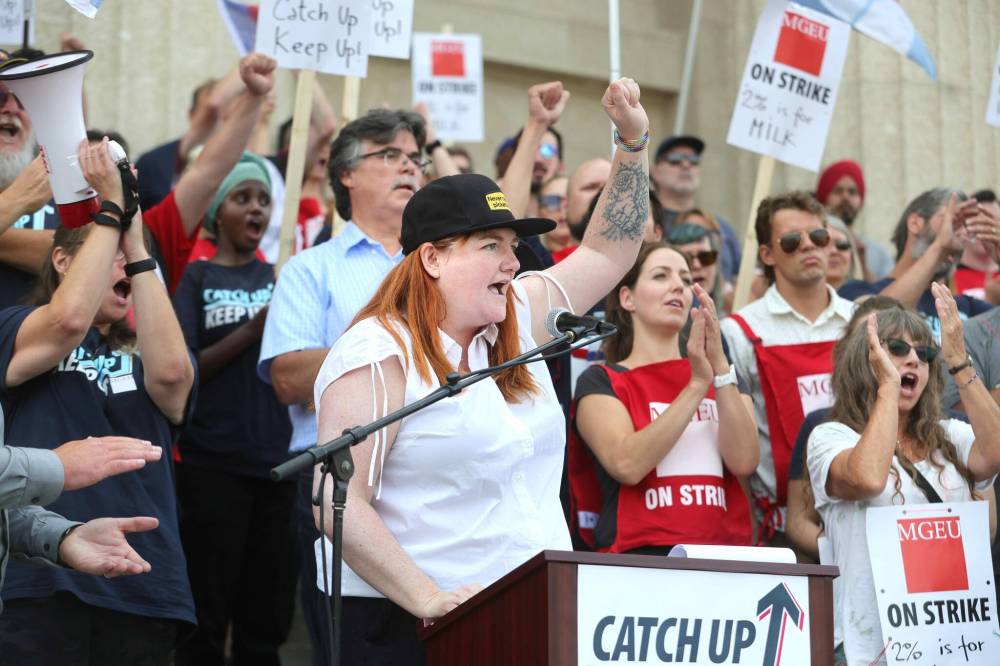Liquor Mart strike siphoned MLL profits
Read this article for free:
or
Already have an account? Log in here »
To continue reading, please subscribe:
Monthly Digital Subscription
$0 for the first 4 weeks*
- Enjoy unlimited reading on winnipegfreepress.com
- Read the E-Edition, our digital replica newspaper
- Access News Break, our award-winning app
- Play interactive puzzles
*No charge for 4 weeks then price increases to the regular rate of $19.00 plus GST every four weeks. Offer available to new and qualified returning subscribers only. Cancel any time.
Monthly Digital Subscription
$4.75/week*
- Enjoy unlimited reading on winnipegfreepress.com
- Read the E-Edition, our digital replica newspaper
- Access News Break, our award-winning app
- Play interactive puzzles
*Billed as $19 plus GST every four weeks. Cancel any time.
To continue reading, please subscribe:
Add Free Press access to your Brandon Sun subscription for only an additional
$1 for the first 4 weeks*
*Your next subscription payment will increase by $1.00 and you will be charged $16.99 plus GST for four weeks. After four weeks, your payment will increase to $23.99 plus GST every four weeks.
Read unlimited articles for free today:
or
Already have an account? Log in here »
Hey there, time traveller!
This article was published 20/02/2024 (661 days ago), so information in it may no longer be current.
A weeks-long shutdown of Liquor Mart locations last summer cut Manitoba Liquor and Lotteries’ profits by an estimated $10 million, owing to lost sales and the cost of hiring replacement staff to keep the booze flowing.
The bitter labour dispute with the Crown corporation’s liquor workers likely prevented millions from flowing into the province’s coffers, MLL chief executive officer Gerry Sul told a legislative committee last week.
The liquor authority spent about $1.25 million on replacement workers and additional storage space while saving about $2.8 million on salaries and benefits for approximately 1,400 striking unionized employees, Sul said.
MIKAELA MACKENZIE / FREE PRESS FILES The liquor authority spent about $1.25 million on replacement workers and additional storage space while saving about $2.8 million on salaries and benefits for approximately 1,400 striking unionized employees, MLL chief executive officer Gerry Sul said.
Meanwhile, the corporation’s gross margin during the approximately five-week dispute — which included lockouts and strike action — was $11.7 million.
“So, in roughly estimating the impact to the organization, or our net income back to the province of Manitoba, we used a rough calculation of what the sales would’ve been or could’ve been during that approximate 45-day period,” Sul explained in response to questions from La Vérendrye MLA Konrad Narth, the Progressive Conservative critic for MLL.
Manitoba Government and General Employees’ Union members ratified a new collective agreement on Aug. 27, ending the labour disruption that started on July 19. The four-year deal includes wage increases of approximately 12 per cent.
RUTH BONNEVILLE / FREE PRESS FILES Manitoba Government and General Employees’ Union members ratified a new collective agreement on Aug. 27, ending the labour disruption that started on July 19. The four-year deal includes wage increases of approximately 12 per cent.
NDP Minister Glen Simard, who is responsible for MLL, said the government recognizes the disruptions hurt more than just the corporation’s bottom line.
“We need to consider the cost to the workforce, the cost to the organization that delivers high-quality products across Manitoba,” Simard said. “I would be remiss if I didn’t mention the cost in the workplace and the employees for (MLL).
During the 90-minute meeting, Simard and Sul were peppered with questions by Narth, who tried to punch holes in the NDP government’s preference for maintaining publicly operated liquor retail locations rather than expanding private sales in the future.
“We need to consider the cost to the workforce, the cost to the organization that delivers high-quality products across Manitoba”–NDP Minister Glen Simard
Narth challenged Sul to provide a comparison of the operating costs for private liquor vendors versus MLL’s Liquor Marts, and questioned whether Liquor Mart stores could operate on the same margin afforded to private players.
“It’s important to Manitobans to see how that breaks down, since we have a blended model that relies on private liquor sale and retailing throughout much of the province,” Narth said.
Before losing government in the Oct. 3 election, the PCs introduced legislation to expand private liquor sales to existing beer vendors and wine stores and to pilot the sale of beer and wine in grocery stores and other retail locations.
The two bills were blocked by the then-Opposition NDP, effectively killing the legislation by preventing their passage before the fall election.
According to MLL, there are 167 private liquor vendors in the province, which contribute about 10 per cent of the corporation’s revenues. Liquor vendors receive a 11.75 per cent discount on wholesale products, Sul said.
MLL’s markup on products are 75 per cent for beer, 95 per cent for wine and refreshment beverages, and 153 per cent for spirits, Sul explained. The corporation posted a $740.9 million profit in 2022-23, including $319.1 million in the liquor segment of its business (a 0.8 per cent increase over the previous year).
The CEO said a comparison of operating costs between the two retail channels is not possible, owing to a lack of insight on private liquor vendors’ profitability.
However, Sul said running Liquor Marts with a 11.75 per cent markup on liquor sales would result in “a reduction, obviously, in the returns to the province.”
Meanwhile, cannabis continues to drive profits for MLL, with year-over-year revenue growth of 27 per cent, according to Sul. The cannabis segment of MLL’s business netted $31.3 million in revenue for the province in 2022-23.
“We’ll continue to look at the model in which cannabis is sold, continue to engage with partners in that industry”–NDP Minister Glen Simard
The number of private cannabis stores in Manitoba has also grown over the past 10 months, from 177 as of last March 31 to just shy of 200.
In response to questions from Narth about public-versus-private retailing, Simard did not rule out the public sale of cannabis in the future amid continued growth in the market.
“We’ll continue to look at the model in which cannabis is sold, continue to engage with partners in that industry,” said Simard. “And, I guess my answer is we’re still … engaging with stakeholders.”
While in opposition, Wolseley MLA Lisa Naylor said an NDP government would take a close look at how cannabis is sold in Manitoba. Simard said the statement from Naylor (now consumer protection minister) still stands.
“I agree … when Minister Naylor states that we should closely look at the practices that have been instituted, and I’ll leave it at that,” Simard said.
According to Sul, the corporation has not considered any alternatives to the current retail model for cannabis.
Simard also said the number of VLT and gambling licences in Manitoba will increase throughout 2024. In 2022-23, MLL’s profits from VLTs were $193.5 million; $91.3 million came from casino operations, with double-digit increases expected.
“As we lift the gaming pause, we welcome engagement with multiple communities to discuss with the stakeholders opportunities, realities within the provincial context for gaming,” Simard said.
danielle.dasilva@freepress.mb.ca



